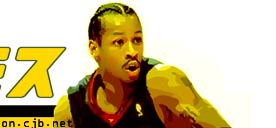





| Allen Iverson: NBA rebel with talent in his court |
|---|
| Corporate America may not be able to ignore bad-boy superstar for long |
|
Over and over, Allen Iverson swerves, ducks, then drives a basketball down the court and shoots, scoring 48 points in a single National Basketball Association playoff game against the formidable Los Angeles Lakers. The stadium erupts. Hugs all around. The Philadelphia 76ers' lead player has proved his talent once more, confounding critics with his intensity, toughness, and a body so thin it seems too small to compete with giants. Off the court, Mr. Iverson is a bundle of contradictions: a little guy with big ambitions; a professional whose past behaviour has been anything but; a former Virginia high-school student who lost eight friends to violence in a single summer, yet managed to escape unharmed. He is also a committed father of two. This month, as playoff fever consumed basketball fans, Mr. Iverson became the focus of this question: Can an in-your-face, black superstar from the streets make it in the land of mainstream corporate endorsements where corn rows, tattoos and rap music are off limits? Right now, it seems doubtful that Mr. Iverson will one day sit on the board of an old established company such as General Motors Corp. or Ford Motor Co. or hobnob with the chief executive officers of the biggest Fortune 500 firms. But who says his image is carved in stone? Like him or not, he is a survivor, a 26-year-old whose determination took him off the streets and into the NBA. "This is a man who would not be alive today if he did not have a posse or the [hip-hop] persona he has developed," said John Thompson, a former coach at Georgetown University who worked with Mr. Iverson for two years. "You cannot compare Tiger Woods with Allen Iverson. Tiger did not have a 16-year-old mother and no father. . . . Allen had to do a lot of things to survive. We forget that. Certainly, as he gets older, he will adjust to his surroundings, and he will mature to fit the environment he is now living in. But that will not happen overnight. It will take time." And if Mr. Iverson's game continues to inspire, if he's sincere about "being more professional" on and off the court, endorsements will come. Wait and see. "Can he sell Brooks Brothers suits?" Mr. Thompson asked. "We don't know yet. What's more, he doesn't have to. The reason: Allen appeals to a lot of other people for different reasons. There are single mothers out there who like to see him with his kids. There are people who come to the games because they like the way he plays. There are hip-hop kids who like the way he dresses as well as his tattoos." Mainstream Americans may shudder, but among the world's youth, Mr. Iverson is the personification of the Hip-Hop Nation, a poster boy for a movement that has travelled from Los Angeles and New York to France, Germany and Japan. Thousands have adopted the music and cultural trappings of African-American urban youth. They're mouthing the lyrics, wearing the clothes and spending millions of dollars on cellphones, jewellery, athletic apparel and CDs. And, at a time when fashion and marketing specialists are delving into the inner city to find the latest trends, Mr. Iverson is the real McCoy. Whether you love him or hate him, one thing becomes clear when he's driving hard down the court: Allen Iverson has grit, the kind that keeps him in the game even after he's wracked with injuries; the kind that makes a little man believe he can win in a big man's game; the kind the most talented -- be they corporate titans, musical prodigies or sports pros -- have in abundance. Mr. Iverson has shocked the establishment. His release of a CD bashing gays and women shows poor judgment and a surprising level of immaturity in a man his age. Mr. Iverson apologized but refused to change the lyrics. A prior jail term has not endeared him to the NBA. Still, Mr. Iverson has taken the game to new heights. If his public statements are any indication, he is also trying harder to change his off-court ways. |

|
|---|
| Author |
| Diane Lewis |
| Source |
| Boston Globe |
| Return to Articles |